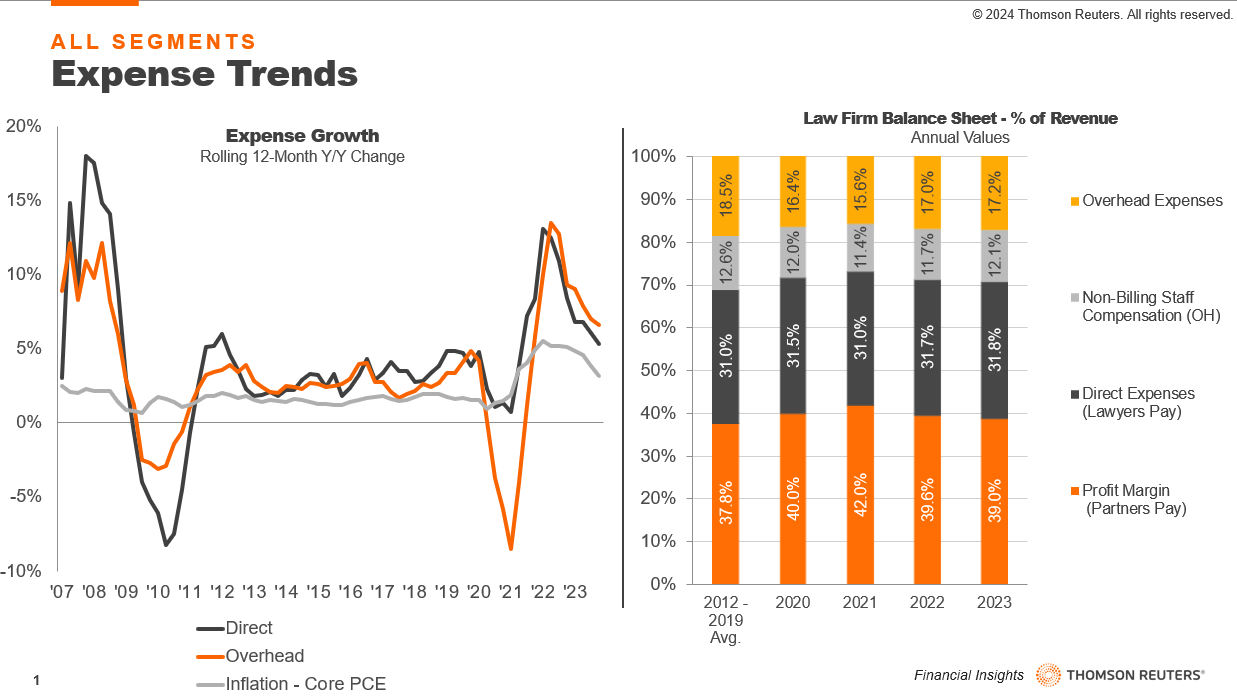By focusing on non-traditional measures and behaviors of performance for their expenses, instead of the dollars and cents associated, CFOs may provide more influential and actionable ways to improve profitability
Law firms have often played a defensive game in protecting their profitability, reacting to market trends by working the margins through such tactics as adjusting headcount levels and reassessing overhead expenses. Law firm chief financial officers (CFOs) furiously worked those levers in steering their firms through both the downturn and subsequent recovery from the COVID-19 pandemic.
As the market continues to move further into the post-pandemic era, however, a new set of concerns are emerging. The most recent Thomson Reuters Institute’s Law Firm Financial Index report, showing results for the fourth quarter of 2023 and for the full year, shows that throughout 2023, profit margins were smaller for a second consecutive year. While Q4 2023 did see positive trends for most key metrics that drive profitability, challenges are looming.

Although overall demand growth was positive in 2023, it was up by an average of less than 1%; and while expense growth is moderating, expenses remain high by historical standards, as shown in the left section of the chart above. As the right section of the chart shows, overhead expense growth has been one of the most significant factors contributing to the recent decline in profit margins. In addition, productivity has been in negative territory for eight consecutive quarters.
Many CFOs currently view their firms as very lean operations, leaving them with little wiggle room to dramatically impact results. Inflation is still a concern, and last fall’s increases in associate compensation at the top of the market haven’t been fully felt yet. Further, direct expense growth looks to trend upwards this year.
Rather than looking to trim expenses around the margins or hunt down unnecessary gross over-expenditures buried in the ledger, many law firm CFOs — especially those with experience in other industries — increasingly are applying a holistic approach that involves more than just expenses and outputs. They now are looking beyond traditional metrics towards leading indicators of the full profitability equation, which may be able to increase their understanding of what truly drives demand, return on investment (ROI), impact, and ultimately, profitability.
Instead of focusing on costs and outputs, many CFOs are looking more at measures of performance, such as:
-
-
- bid-to-win ratios
- book-to-bill rates
- time entry speed
- revenue per lawyer (rather than hours per lawyer), and
- client satisfaction ratings
-
That last one is particularly noteworthy, as research shows client satisfaction ratings are one of the most impactful leading indicators of growth potential with a client. If clients aren’t rating your firm a 9 or 10 in overall satisfaction, it makes it significantly more difficult to expand that relationship. Below that level, a firm could be quietly leaking business — and while a client may not officially sever its ties with the firm, it may simply not be giving as much business to that firm as before.
Focusing on performance-based metrics can also lead to effective tactics such as client mix optimization. Many firms have a long tail of hundreds — sometimes thousands — of clients that are low-yield and low-profit yet can comprise more than 60% of a firm’s business. Assessing and optimizing client mix can help firms make sure their resources are prioritized towards their most profitable clients.
Similarly, budgets can be allocated to those areas that are determined to be the biggest drivers of growth and ROI, whether new business development, cross-selling, geographic expansion, or other areas.
Rather than looking to trim expenses around the margins or hunt down unnecessary gross over-expenditures buried in the ledger, many law firm CFOs — especially those with experience in other industries — increasingly are applying a holistic approach that involves more than just expenses and outputs.
With increasing emphasis on performance-based metrics, scorecards can become part of lawyer compensation conversations and reviews. Timely spend messaging can remind lawyers to closely monitor matter budgets to avoid expense creep or overly aggressive write-downs. Periodic messaging on the importance of cost control can instill a strong firm culture of attention to costs for every matter.
On the more familiar territory of traditional cost optimization tactics, there are always areas in which firms can scour expenses to boost the bottom line. Some law firm CFOs are bringing in third parties to review and renegotiate contracts. And with realization being a perennial concern, firms are exploring tactics such as automatic write-downs of invoices open past a set time, penalties for extended time between billing and closing dates, and other means of instituting better financial hygiene and discipline.
Finally, with expenses being an inevitable core lever for profitability, CFOs are turning their attention to how they can measure performance at the firm-, practice-, and lawyer-levels to generate more topline business. In addition, changing client expectations and technology advancements such as artificial intelligence are challenging the traditional billing-hour relationship by which firms have typically measured revenue, productivity, and profitability trends.
In this evolving landscape, law firms and their CFOs must reconsider their approach towards evaluating those metrics — as well as expenses — through the lens of performance to adapt and thrive in the future.







